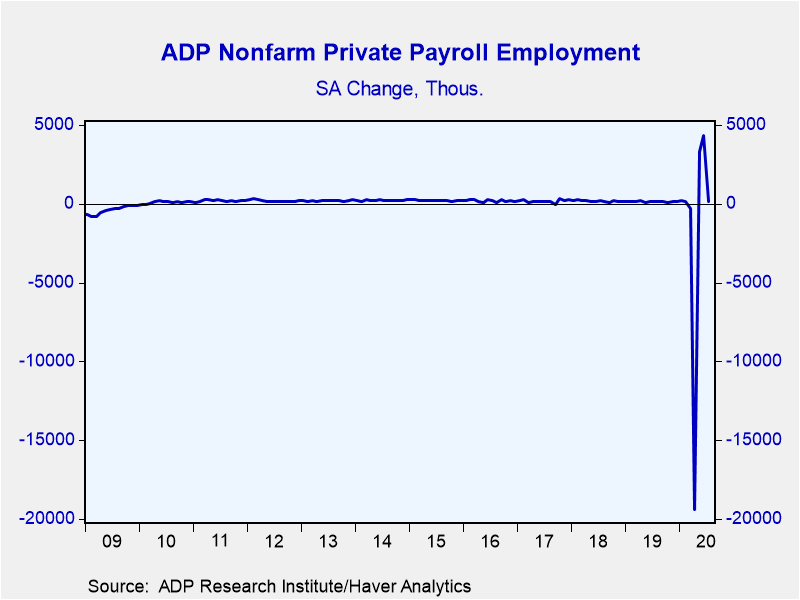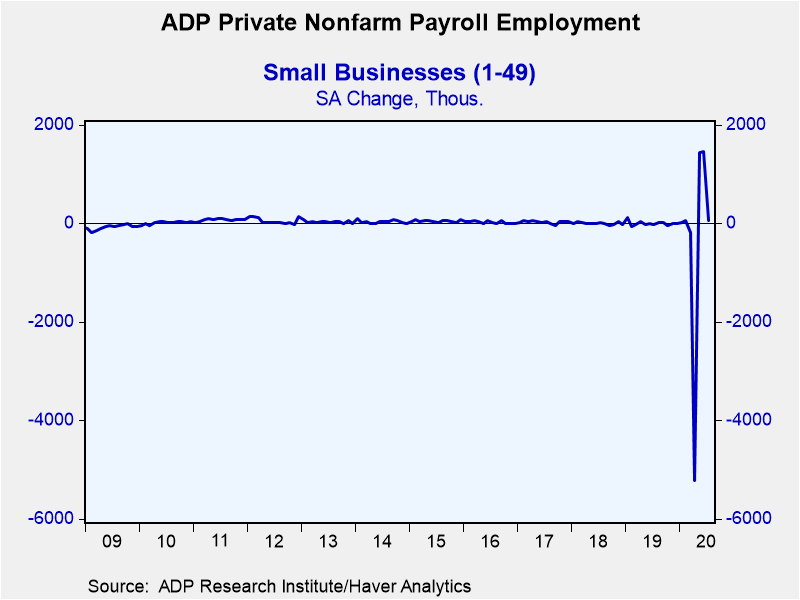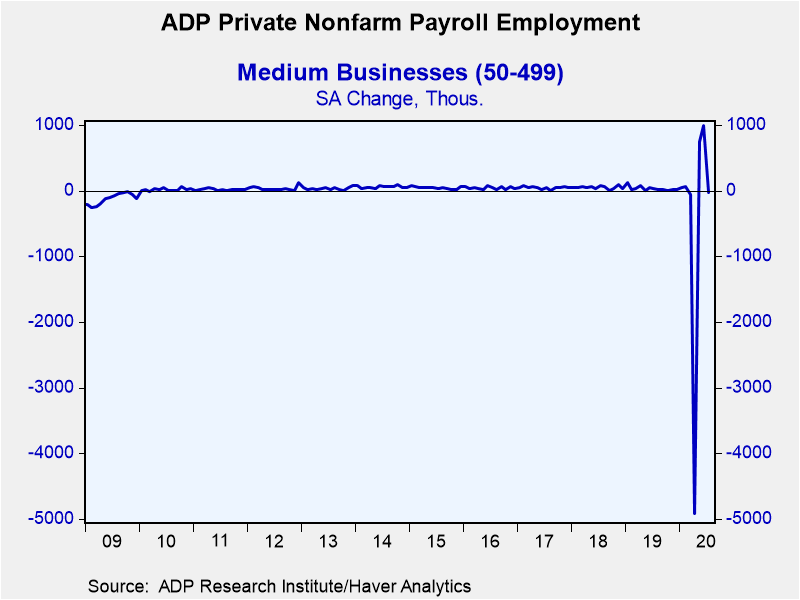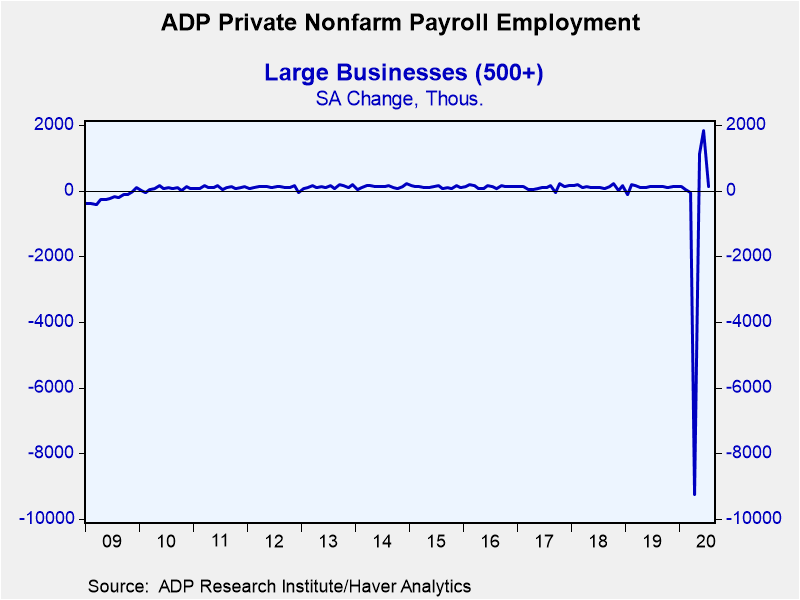 Global| Aug 05 2020
Global| Aug 05 2020U.S. ADP Nonfarm Private Payroll Gains Slow in July
by:Tom Moeller
|in:Economy in Brief
Summary
• Employment slowdown is broad-based last month. • Earlier figures were revised significantly higher. Job market improvement was notably diminished during July. The ADP National Employment Report indicated that nonfarm private [...]
• Employment slowdown is broad-based last month.
• Earlier figures were revised significantly higher.
Job market improvement was notably diminished during July. The ADP National Employment Report indicated that nonfarm private payrolls gained 167,000 (-8.4% y/y) last month following a 4.314 million June increase, revised from 2.369 million. May's increase was revised to 3.341 million from 3.065 million. The latest figure compared to a 1.500 million increase expected in the Action Economics Forecast Survey. The ADP report is based on data through July 12.
Large payrolls increased 129,000 (-8.3% y/y) after improving 1.847 million in June, revised from 873,000. Small payrolls improved 63,000 last month (-7.1% y/y) after strengthening 1.470 in June, revised from 937,000. Medium-sized payrolls recorded a 25,000 decline (-10.2% y/y) after improving 996,000 in June, revised from 559,000.
Within industry sectors, employment amongst goods-producing firms edged up a minimal 1,000 (-5.6% y/y) after rising 496,000 in June, revised from 457,000. The size of construction sector payrolls declined 25,000 last month (-3.8% y/y) after a 202,000 improvement, revised down from 394,000. Factory sector employment rose 10,000 (-6.2% y/y) following a 307,000 rise, revised from 88,000. Employment in the natural resource & mining sector improved fell 1,000 (-13.8% y/y), continuing a long decline.
Employment in the private service sector rose a diminished 166,000 following a 3.818 million June strengthening, revised from 1.912 million. An 18,000 decline (-1.6% y/y) in the financial services sector paced last month's weakness as it followed a 39,000 rise, revised from 65,000. Trade, transportation & utilities jobs rose 41,000 (-6.1% y/y) after a 792,000 gain, revised from 288,000. Employment in the professional & business services sector increased 58,000 (-6.9% y/y) following a 276,000 rise, revised from 151,000. A 38,000 improvement in leisure & hospitality sector came after a 1.873 million increase, revised from 961,000. Education & health services jobs rose 46,000 following a 512,000 rise, revised from 283,000. Information sector payrolls fell 3,000 (-10.6% y/y) for a second straight month.
The Automatic Data Processing Research Institute survey covers 411,000 companies and includes about one-fifth of U.S. private payroll employment. The data are processed by Moody's Analytics Inc., then calibrated and aligned with the BLS establishment survey data. The ADP data cover private sector employment only.
The ADP National Employment Report data can be found in Haver's USECON database. Historical figures date back to 2001 for private employment and the industry breakdown, and 2005 for the business size breakout. The expectation figure is available in Haver's AS1REPNA database.
| ADP/Moody's National Employment Report | Jul | Jun | May | Jul Y/Y | 2019 | 2018 | 2017 |
|---|---|---|---|---|---|---|---|
| Nonfarm Private Payroll Employment (m/m chg, 000s) | 167 | 4,314 | 3,341 | -8.4% | 1.5% | 1.8% | 1.7% |
| Small Payroll (1-49) | 63 | 1,470 | 1,442 | -7.1 | 0.2 | 0.6 | 1.1 |
| Medium Payroll (50-499) | -25 | 996 | 751 | -10.2 | 2.0 | 2.0 | 1.9 |
| Large Payroll (>500) | 129 | 1,847 | 1,147 | -8.3 | 1.9 | 2.3 | 2.0 |
| Goods-Producing | 1 | 496 | 667 | -5.6 | 1.6 | 2.9 | 1.8 |
| Construction | -8 | 202 | 432 | -3.8 | 2.7 | 4.1 | 3.7 |
| Manufacturing | 10 | 307 | 253 | -6.2 | 1.0 | 1.9 | 0.8 |
| Service-Producing | 166 | 3,818 | 1,674 | -9.0 | 1.5 | 1.6 | 1.7 |
Tom Moeller
AuthorMore in Author Profile »Prior to joining Haver Analytics in 2000, Mr. Moeller worked as the Economist at Chancellor Capital Management from 1985 to 1999. There, he developed comprehensive economic forecasts and interpreted economic data for equity and fixed income portfolio managers. Also at Chancellor, Mr. Moeller worked as an equity analyst and was responsible for researching and rating companies in the economically sensitive automobile and housing industries for investment in Chancellor’s equity portfolio. Prior to joining Chancellor, Mr. Moeller was an Economist at Citibank from 1979 to 1984. He also analyzed pricing behavior in the metals industry for the Council on Wage and Price Stability in Washington, D.C. In 1999, Mr. Moeller received the award for most accurate forecast from the Forecasters' Club of New York. From 1990 to 1992 he was President of the New York Association for Business Economists. Mr. Moeller earned an M.B.A. in Finance from Fordham University, where he graduated in 1987. He holds a Bachelor of Arts in Economics from George Washington University.
More Economy in Brief
 Global| Feb 05 2026
Global| Feb 05 2026Charts of the Week: Balanced Policy, Resilient Data and AI Narratives
by:Andrew Cates










